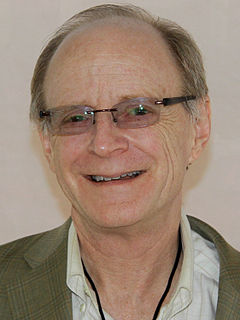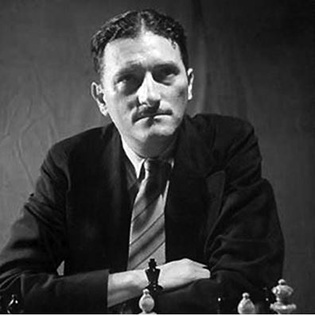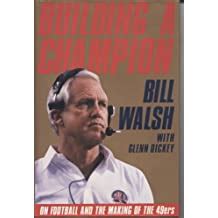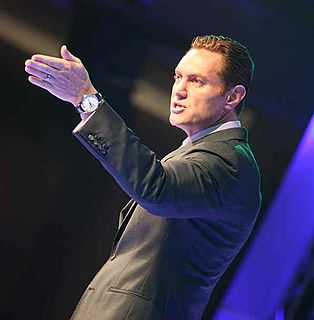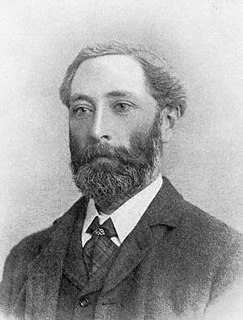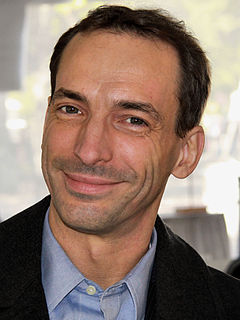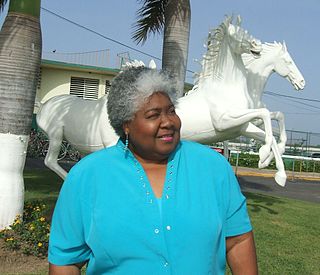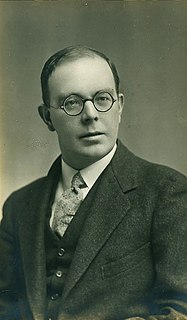Top 218 Psychologists Quotes & Sayings - Page 4
Explore popular Psychologists quotes.
Last updated on April 17, 2025.
The answer, usually, is no. Wisdom is a quality that defies easy definition but psychologists who study aging have found that some of its components - judgment, emotional regulation - do improve with age in most people, consciously or not. Of course there is a subset of people out there who are sitting in their rocking chairs, spewing hate, but my guess is that these people weren't very pleasant to begin with, ... The reality is that the data are fairly convincing that people as they get older become more positive and less self-absorbed.
The physical basis for sociopathy is approximately 50 percent inheritable, which sounds more dramatic than it probably is, because most personality characteristics that psychologists test for and study the genetics of are about 50 percent inheritable. Introversion, extroversion, it turns out that they're about 50 percent inheritable, which means that somehow sociopathy is physical, it's organic.
Our problem was that in the American approach to Soviet affairs policy has oscillated between people who take an essentially psychological approach and people who take an essentially theological approach, and the two really meet. The psychologists try to "understand" the Soviet Union. And try to ease its alleged fears. The theologians say the Soviets are evil.
The huge egos of great chess players are legendary. Psychologists have been amazed by their vanity, have studied it, and anecdotes concerning it are abundant. But never before has there been such a prima donna as Bobby. Already he has managed to alienate and offend almost everybody in the chess world. That includes officials, patrons, writers, almost everybody and anybody who might be in a position to help him in his career.
Strength of will - is essential to your survival and success. The competitor who won't go away, who won't stay down, has one of the most formidable competitive advantages of all. In evaluating people, I prize ego. It often translates into a fierce desire to do their best and an inner confidence that stands them in good stead when things really get rough. Psychologists suggest that there is a strong link between ego and competitiveness. All the great performers I've ever coached had ego to spare.
Child psychologists have demonstrated that our minds are actually constructed by these thousands of tiny interactions during the first few years of life. We aren't just what we're taught. It's what we experience during those early years - a smile here, a jarring sound there - that creates the pathways and connections of the brain. We put our kids to fifteen years of quick-cut advertising, passive television watching, and sadistic video games, and we expect to see emerge a new generation of calm, compassionate, and engaged human beings?
There are moments, psychologists tell us, when the passion for sin, or what the world calls sin, so dominates a nature, that every fibre of the body, as every cell of the brain, seems to be instinct with fearful impulses. Men and women at such moments lose the freedom of their will. They move to their terrible end as automatons move. Choice is taken from them, and conscience is either killed, or, if it lives at all, lives but to give rebellion its fascination, and disobedience its charm.
It is amazing to observe how many psychologists and psychiatrists have accepted this sort of propaganda, and have come to believe that homosexual males and females are discretely different from persons who respond to natural stimuli. Instead of using these terms as substantives which stand for persons, or even as adjectives to describe persons, they may better be used to describe the nature of the overt sexual relations, or of the stimuli to which an individual erotically responds.
When we have an experience -- hearing a particular sonata, making love with a particular person, watching the sun set from a particular window of a particular room -- on successive occasions, we quickly begin to adapt to it, and the experience yields less pleasure each time. Psychologists call this habituation, economists call it declining marginal utility, and the rest of us call it marriage
Psychologists tell us we think 50,000 thoughts a day...between 1,000
and 5,000 thoughts in a single hour. Many of those thoughts are about
ourselves and about our performance, about our lovability, our capability
and our significance. So the key is to control those thoughts, making
certain they're always positive.
It is quite evident that a barrier must be cleared in order to escape the psychologists and enter into a realm which is not "auto-observant", where we ourselves no longer divide ourselves into observer and observed. Then the dreamer is completely dissolved in his reverie. His reverie is his silent life. It is that silent peace which the poet wants to convey to us.
If you haven’t already clearly defined your values, you may find yourself making choices that conflict with what you want. If, for example, honesty is a big thing for you, but you hang out with liars, there’s a conflict. When your actions conflict with your values, you’ll end up unhappy, frustrated, and despondent. In fact, psychologists tell us that nothing creates more stress than when our actions and behaviors aren’t congruent with our values.
The manner of Demoivre's death has a certain interest for psychologists. Shortly before it, he declared that it was necessary for him to sleep some ten minutes or a quarter of an hour longer each day than the preceding one: the day after he had thus reached a total of something over twenty-three hours he slept up to the limit of twenty-four hours, and then died in his sleep.
Mothers and fathers act in mostly similar ways toward their young children. Psychologists are still highlighting small differencesrather than the overwhelming similarities in parents' behaviors. I think this is a hangover from the 1950s re-emergence of father as a parent. He has to be special. The best summary of the evidence on mothers and fathers with their babies is that young children of both sexes, in most circumstances, like both parents equally well. Fathers, like mothers, are good parents first and gender representatives second.
The great paradox of determinism and free will, which has held the attention of the wisest of philosophers and psychologists for generations, can be phrased in more biological terms as follows: If our genes are inherited, and our environment is a train of physical events set in motion before we were born, how can there be a truly independent agent within the brain? The agent itself is created by the interaction of the genes and the environment. It would appear that our freedom is only a self delusion.
The psychologists are valiantly trying to provide us with answers, the religious people are trying to provide us with answers. I think it properly falls on the cultural workers to investigate this predicament with a little less concern for the marketplace and a little more concern for their higher calling.
Right now, America doesn't ask us to do anything besides pay taxes. We don't even have to vote. But as psychologists will tell you, when you have to sacrifice for something, you value it more. What about national service for young people? Everybody between 18 and 24 could spend a year or two working for this country in some capacity. It'd be an amazing thing. And it would mix this country racially, culturally, economically.
Of course, there remains the question of why we should find mind-brain identities so persistently counter-intuitive, if they are true. But this is a simple psychological question, and there are a number of plausible explanations. Indeed this is a topic that is quite extensively discussed outside philosophy, by developmental psychologists and theorists of religion among others, under the heading of 'intuitive dualism'. It is rather shocking that so few of the many philosophers working on 'the explanatory gap' are familiar with this empirical literature.
The deepest principle in human nature is the craving to be appreciated."Mark McCormack, Author and sports entrepreneur"Psychologists tell us that money is a satisfier, not a motivator... Recognition is. That's why we do what we do... Recognition is critical to self-esteem. Without it, we feel undervalued, even insignificant. Money is nice, sure. But once you establish a basis of monetary rewards, without the accompanying verbal and social affirmation, the employee will quickly become disgruntled and ask for more. Eventually, more will never be enough.
I believe-and human psychologists, particularly psychoanalysts should test this-that present-day civilized man suffers from insufficient discharge of his aggressive drive. It is more than probable that the evil effects of the human aggressive drives, explained by Sigmund Freud as the results of a special death wish, simply derive from the fact that in prehistoric times intra-specific selection bred into man a measure of aggression drive for which in the social order today he finds no adequate outlet.
Psychologists usually offer three explanations for the failure of group brainstorming. The first is social loafing: in a group, some individuals tend to sit back and let others do the work. The second is production blocking: only one person can talk or produce an idea at once, while the other group members are forced to sit passively. And the third is evaluation apprehension, meaning the fear of looking stupid in front of one's peers.
I'd like to say is that we shouldn't have an idea that the goal of spiritual practice is to annihilate ones ego, that would be a mistake. In the early years of enlightenment, psychologists were afraid of Hindus and Buddhists meditating because they thought they were going to shatter their egos and then they'd have to wear diapers or something, like they'd lose their toilet training or what have you. They were really afraid of it.
What matters most in a child’s development, they say, is not how much information we can stuff into her brain in the first few years. What matters, instead, is whether we are able to help her develop a very different set of qualities, a list that includes persistence, self-control, curiosity, conscientiousness, grit, and self-confidence. Economists refer to these as noncognitive skills, psychologists call them personality traits, and the rest of us sometimes think of them as character.
Psychologists would say that the only two important forms of social learning are imitation and teaching, and they will spend time trying to figure out if animals imitate or teach. Sometimes they find they do; sometimes they find they don't. And so that's kind of the level of controversy there. Biologists would include imitation and teaching and a range of other kinds of social learning. So we would call that culture, whereas the psychologist wouldn't.
Wherever possible, home is by far the best nest until at least eight, ten or twelve. Psychologists and psychiatrists who understand child development would prefer an even later age. In a reasonably warm home, parent-child responses, the true ABC's of sound education, are likely to be a hundred times more frequent than the average teacher-child responses in a classroom.
The Door Without a Key is the Door of Dreams; it is the door by which the sensitive escape into insanity when life is too hard for them, and artists use it as a window in a watch-tower. Psychologists call it a psychological mechanism; magicians call it magic, and the man in the street calls it illusion or charlatanry according to taste. It does not matter to me what it is called, for it is effectual.
Nearly half a century has passed since Watson proclaimed his manifesto. Today, apart from a few minor reservations, the vast majority of psychologists, both in this country and in America, still follow his lead. The result, as a cynical onlooker might be tempted to say, is that psychology, having first bargained away its soul and then gone out of its mind, seems now, as it faces an untimely end, to have lost all consciousness.
Yet each of us also carries another portrait with us, a picture far more important than any in our wallet. Psychologists have a name for it. They call that mental picture of ourselves, our self-image. ... there's always the person whose self-image is bent all out of shape, like a photo carried too long in a wallet.The good news of the tremendous worth we have in God's eyes can light up our inner self-portrait.
I was very bored at school. I found it very easy and slow and grey. My teachers didn't really know how to handle me, because I was very sarcastic. I was over-confident, arrogant, a typical youngest child. I went through periods of withdrawing into myself and school psychologists tried to figure me out, work out why I didn't fit in. I found that irritating, too.
How do we regulate our emotions? The answer is surprisingly simple: by thinking about them. The prefrontal cortex allows each of us to contemplate his or her own mind, a talent psychologists call metacognition. We know when we are angry; every emotional state comes with self-awareness attached, so that an individual can try to figure out why he's feeling what he's feeling. If the particular feeling makes no sense—if the amygdala is simply responding to a loss frame, for example—then it can be discounted. The prefrontal cortex can deliberately choose to ignore the emotional brain.
Each part of the mind sees only a little of what happens in some others, and that little is swiftly refined, reformulated and "represented." We like to believe that these fragments have meanings in themselves - apart from the great webs of structure from which they emerge - and indeed this illusion is valuable to us qua thinkers - but not to us as psychologists - because it leads us to think that expressible knowledge is the first thing to study.
Beauty has never been an important topic in the writings of the major psychologists. In fact, for Jung, aesthetics is a weak, early stage of development. He follows the Germanic view that ethics is more important than aesthetics, and he draws a stark contrast between the two. Freud may have written about literature a bit, but an aesthetic sensitivity is not part of his psychology.
We've learned a lot from the great psychologists. Wilhelm Reich wrote about the relationship between fascism and sexual repression. Freud rediscovered the underworld of consciousness that European rationalism had denied. But when you have a nation of people in therapy and counselling, "support" groups for every kind of human condition, where, in the clichés of that milieu, people "share" and "heal," the question, "What for?", "What now?" is no longer asked.
Marriage has become a battlefield where two persons are fighting for supremacy. Of course, the man has his own way: rough and more primitive. The woman has her own way: feminine, softer, a little more civilized, more subdued. But the situation is the same. Now psychologists are talking about marriage as an intimate enmity. And that's what it has proved to be. Two enemies are living together pretending to be in love, expecting the other to give love; and the same is being expected by the other. Nobody is ready to give - nobody has it. How can you give love if you don't have it?
Many psychologists ... thought by turning their attention to their own consciousness to be able to explain what happened when we were thnking. Or they sought to attain the same end by asking another person a question, by means of which certain processes of thought would be excited, and then by questioning the person about the introspection he had made. It is obvious ... that nothing can be discovered in such experiments.
The most important thing you can do individually and organizationally is to pay attention to your own creativity. Sports psychologists call this muscle memory or paying attention to your perfect performance. In your own life you can notice when you do something that works right for you and celebrate it. The more you do this, the greater the probability that you will act creatively in future situations.
If you look at the works psychologists have done about individual reports of wellbeing, what happens is that if you're poor, you are not happy. But once you achieve a certain level of material satisfaction then income has very little correlation with people's reported states of happiness, things like climate matter more, things like the culture of the country in which you're raised matter more and so the things really, let's face it, like individual temperament matter more than these things.
